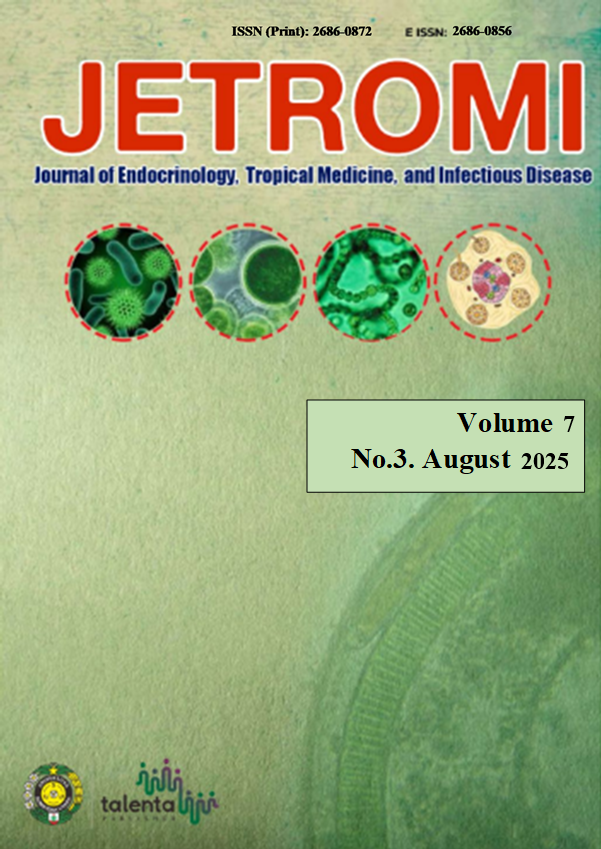Incidence of Bleeding Complications in Acute ST-Elevation Myocardial Infarction Patients Undergoing Primary Percutaneous Coronary Intervention
DOI:
https://doi.org/10.32734/jetromi.v7i3.21143Keywords:
Bleeding complications, Acute Coronary Syndrome (ACS), ST-Elevation Myocardial Infarction (STEMI), Primary Percutaneous Coronary Intervention (PPCI)Abstract
Background: This study aims to comprehensively describe the incidence, types, and associated risk factors of bleeding complications in patients with ST-elevation myocardial infarction (STEMI) undergoing primary percutaneous coronary intervention (PPCI), addressing a critical gap in the literature given the global burden of cardiovascular disease and the inherent bleeding risks of contemporary antithrombotic therapies.
Methode: This retrospective cross-sectional study will investigate the incidence and types of bleeding complications, along with associated risk factors, in ST-elevation myocardial infarction (STEMI) patients undergoing primary percutaneous coronary intervention (PPCI) at Adam Malik Hospital Medan, analyzing data from May 2022 to December 2024 through ethical review and statistical analysis using SPSS version 23.
Result: Of 245 STEMI patients undergoing primary PCI, 42.9% experienced bleeding, predominantly minor (BARC 1 and 2, 94.2% combined), with significant associations observed between bleeding and lower hemoglobin, higher leukocyte and creatinine levels, higher TIMI score, Killip class 3 and 4, diabetes, use of maintenance heparin, and increased mortality (84.6% of all deaths occurred in bleeding patients), while hematuria and puncture site hematoma were the most common bleeding sources.
Conclusion: This study found that 42.9% of 245 STEMI patients undergoing primary PCI experienced bleeding complications, predominantly minor (94.2%), with an average age of 55.22 years and a male majority.
Keyword: Bleeding complications, Acute Coronary Syndrome (ACS), ST-Elevation Myocardial Infarction (STEMI), Primary Percutaneous Coronary Intervention (PPCI)
Downloads
Downloads
Published
Issue
Section
License
Copyright (c) 2025 Journal of Endocrinology, Tropical Medicine, and Infectious Disease (JETROMI)

This work is licensed under a Creative Commons Attribution-NonCommercial-ShareAlike 4.0 International License.
The Authors submitting a manuscript do so on the understanding that if accepted for publication, copyright of the article shall be assigned to Journal of Endocrinology, Tropical Medicine and Infectious Diseases (JETROMI).
Copyright encompasses exclusive rights to reproduce and deliver the article in all form and media. The reproduction of any part of this journal, its storage in databases and its transmission by any form or media, will be allowed only with a written permission from Journal of Endocrinology, Tropical Medicine and Infectious Diseases (JETROMI).








